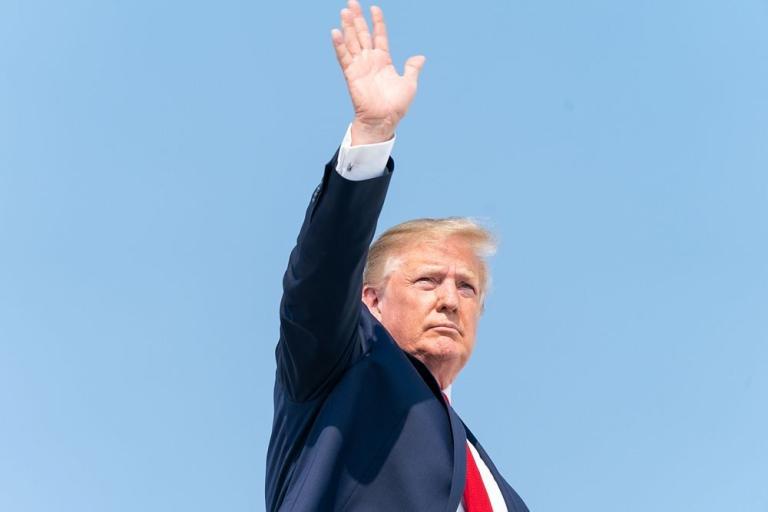*Note: This post has been slightly updated and expanded by the author for clarity.
It goes without saying: Donald Trump ignited nothing less than a wholesale historiographical and sociological reckoning with American evangelicalism. Books like Jemar Tisby’s The Color of Compromise, Sam Perry and Andrew Whitehead’s Taking America Back for God, Robert P. Jones’s White Too Long, Anthea Butler’s White Evangelical Racism, John Fea’s Believe Me, Tim Alberta’s The Kingdom, the Power, and the Glory, and Kristin Du Mez’s Jesus and John Wayne lined booksellers’ shelves and filled Amazon shopping carts for the last eight years. Magazine and newspaper columns from insiders like David French, David Brooks, and Russell Moore grappled with implications of the fractured evangelical landscape. Each text, a different angle and method, but collectively these among many others formed a corpus of critique, prodding at the moral hypocrisy and political opportunism of the postwar American evangelical consensus. Evangelicals’ attention in American society, these studies claimed, was energized by fear—fear of a secular elite, fear of losing influence, fear of cultural and demographic changes. This fear invigorated markets, media landscapes, and special-interest groups touting “family values,” “traditional” gender roles, the biblical grounds for a free market, and a hawkish defense of American exceptionalism and nationalistic fervor.
White evangelicalism was a problem. Be it the boat-burning Christian nationalists in Moscow, Idaho, the billionaire scripture smugglers in Washington, the gentle-parenting skeptics in Colorado Springs, the kiss-free courters and the blue-breasted intellectuals in Louisville, the cussing pastors in Seattle, or the countless Bible-believing faithful subsisting on a diet of Trump Steaks and years of Rush Limbaugh’s red meat, these authors claimed the political fiasco of Donald Trump was largely the fault of long misguided and malformed evangelical consciences. In the words of Kristin Du Mez, “evangelical support for Trump was no aberration, nor was it merely a pragmatic choice. It was, rather, the culmination of evangelicals’ embrace of militant masculinity, an ideology that enshrines patriarchal authority and condones the callous display of power, at home and abroad…evangelicals did not cast their vote despite their beliefs, but because of them.”
Evangelical Schadenfreude
Everyone knew white evangelicals were going to go in for Trump again. But the initial surprise of the election was early exit poll data showing Trump’s modest gains with Black and Latino voters, particularly men. This was a revelation. The clouds parted as the vision of ethnic minorities nudging Trump over the finish line in key states descended like a dove from heaven, vindicating evangelicals as totally normal and, when it came to racist bones, as gelatinous as jellyfish. As the post-election data began trickling in, a wave of conservative evangelical schadenfreude directed at the new evangelical historiography followed swiftly behind.
Daniel Darling, director of the Land Center for Cultural Engagement at Southwestern Baptist Theological Seminary in Fort Worth, Texas, posted on X (formerly Twitter) that morning, “It’s going to be hard to make the tortured, but commercially successful, ‘White evangelicals are a threat and danger to this country’ thesis after the diverse coalition that won for Republicans. That doesn’t mean folks won’t keep trying.” Longtime Gospel Coalition author and pastor Justin Taylor posted survey data illustrating the rightward election tilt of Latino, Black, and other voters of color, sarcastically commenting that there would be “so many new groups to lament, denounce, chastise, harangue, bemoan, and berate.”
New Apostolic Reformation and Christian Nationalist influencer Lance Wallnau posted a picture of a bright red electoral map from 2024’s election results with the caption: “The new spiritual heat map. Too bad our evangelicals [sic] leaders were so obsessed with Christian Nationalism that they missed the boat.”
Megan Basham of the Daily Wire and author of Shepherds for Sale, a recent book accusing mainstream evangelical leaders of taking up progressive causes in order to win social capital, posted that “[Christianity Today], [David] French, and so many of the rest of these institutional leaders were so sure they were aligning with a respectable progressive ruling class who would give them a place as loyal opposition forever. God had other plans. A real opposition rose up.”
Over at WORLD, Samuel James chided Democrats for taking Black and Latino voters for granted and shoving “woke” ideology down their constituents’ throats. “People with nonwhite skin do not leave their consciences or their concerns at the door when they go to vote,” James wrote. “This is a lesson the Democratic Party has learned the hard way.” Tellingly, James continued that evangelicals did people of color a disservice by acting as if they needed to be “protected from conservative theology.” For James, this is not only wrong, but futile: “Reality”—(that is, right-wing political ideology)—“always wins in the end.”
(As an aside, Trump’s modest gains with voters of color simply cannot be a balm to a white evangelical contingent that has spent sixty-plus years demonizing those very groups for their political loyalties. From Ronald Reagan’s castigation of the “welfare queen,” to David Barton’s false claims that the KKK was founded by the Democratic Party (thus, Black citizens are ignorantly voting against their own interests), to Babylon Bee editor Joel Berry posting days before the 2024 election that the Black church was “in shambles” and “run by race-grifting arms of the DNC” who were leading their congregants astray, white evangelicals have consistently dismissed Black Protestant voters as out of line. They have hounded Black voters for loyalty to the Democratic Party while never investigating their own political motives or their partisan bedfellows.)
Andrew T. Walker’s opinion piece, also at WORLD, dismissed the criticisms of Never-Trumper evangelicals like Russell Moore and David French. “There is a reason that 82% of white evangelicals voted for Trump this year, and if all the explanations that evangelicalism’s critics come up with are reduced to accusations of racism, authoritarianism, misogyny, and nativism, then that shows even more the disconnect the accusers have in understanding how everyday evangelicals think.” For Walker, there were plenty of “highly rational reasons” for evangelical alignment with Trump: “his economy, his immigration policy, his foreign policy, his personnel, his opposition to gender ideology, his judicial appointments, his pro-religious liberty agenda, and his promise to dismantle the federal bureaucracy.” Near the end of his piece, Walker threw down the gauntlet: “So, go ahead and throw out your ‘Christian nationalist’ epithets all you want. Call us hypocrites, sellouts, theocrats, etc., etc. Indict the supposed seared conscience all you want. People aren’t listening, and frequently using those terms will only confirm the growing irrelevance of those who invoke them.”
Needless to say, a decisive Trump victory had right-wing evangelicals brimming. But was this election a vindication of evangelical views? Does it stand as a referendum against all those scholars who accused white evangelicals of corrosive and fear-based politics? No. Whatever the reasons for the uptick in support for Trump among ethnic minorities, both current data and past history make crystal clear: White evangelicals voted Donald Trump into office for white evangelical reasons. However “rational” Walker and others might argue those reasons are, at base they are still tied to patriarchal notions of gender and family, fear of racial and cultural outsiders, and a desire for social control. And despite the difference in timbre between a Trump rally and the rhetoric of evangelical leaders, the message Trump’s camp continually touts has resonated with evangelicals’ political instincts. The bombast of the MAGA megaphone can often mask the real symmetry between the social goals of the Trump administration and those of the evangelical world. Let me illustrate with just two examples, linking the campaign rhetoric of 2024 Trump ticket, the history of evangelical messaging on key social matters, and the current survey data from groups like Pew and PRRI.
The Fecund vs. the Feline
“We’re effectively run, in this country—via the Democrats, via our corporate oligarchs—by a bunch of childless cat ladies who are miserable at their own lives and the choices that they’ve made and so they want to make the rest of the country miserable, too.” JD Vance’s 2021 Fox News soundbite may have made some evangelicals cringe when it reappeared in 2024. It was panned by many as evidence of Vance’s radical views, his disdain for women, and his unfitness as a vice presidential candidate. But evangelical leaders have been saying much of the same—albeit in more evangelical ways—for the last 30 years. As Sophie Bjork-James writes in The Revealer, “Far from a one-off comment, Vance’s repeated focus on the childless is a new expression of a much older mainstay of the Christian Right: a focus on the family—meaning only nuclear, patriarchal families are legitimate. Criticisms of the childless, and childless women in particular, along with a new focus on anti-trans rhetoric and policies, represent a new version of this much older focus on the patriarchal family.”
The Christian Right has made a meal out of pro-family rhetoric for decades, praising early marriage, 9-to-5 dads and stay-at-home moms. It has also denigrated couples who voluntarily don’t have kids. In 2005, Southern Baptist Theological Seminary president Albert Mohler appeared on Anderson Cooper’s show decrying the trend of fewer adults having children. Mohler said having children was essential to “growing up,” that it was a “moral point to be made” that voluntarily childless couples were hampering society and avoiding responsibility. A few years prior he had even characterized voluntary childlessness in marriage as “moral rebellion.” In the last few years, pastor and author Kevin DeYoung went viral promoting his “militant fecundity” strategy—the way to win the culture war was to have more Christian babies, because the ones who weren’t reproducing were the immoral secularist elites. More recently, Shane Morris, a writer and podcast host for the Colson Center, tweeted out in 2022 that “cavalier” millennials who weren’t having kids would be in for a rude awakening of loneliness and confusion as they aged. He expanded on his sentiment in an article for the Council on Biblical Manhood and Womanhood, linking lower birthrates to societal decline and placing the blame on the shoulders of idolatrous millennials who were shirking God’s command in Genesis 1:28 to “be fruitful and multiply.”
If evangelicals’ fecundity hasn’t proven sufficient to preserve the moral conscience of the republic, their rhetoric around gender and the family has still produced a quiver full of questionable beliefs. The Public Religion Research Institute’s survey data two months prior to the election show that 64% of white evangelicals agree that society as become “too soft and feminine”—up 3 points from 2022. Pew Research found in 2021 found white evangelicals were the only religious subgroup in the US where the majority say “prioritizing marriage and having children is better for society” than other priorities. Concerns about the shrinking population and childless adults are nourished by longstanding criticisms of feminism as the virus contaminating American society. And while Vance’s polarizing campaign messaging that Democratic leaders without kids were “sociopaths” and “less mentally stable” than conservative Americans with families may have turned up the polemical volume, it isn’t much different in principle from the evangelical message that the “liberal” way of family—heterosexual couples choosing not to have kids or women prioritizing career or lifestyle over childrearing—was rebellious, immoral, selfish, cavalier, disobedient to God’s commands, and bad for America.
Immigration
In 2005, Mexican pastor Julian Herrera encountered Republican evangelicals’ hardline stance at a Christian Coalition of Georgia meeting. “They said they needed to ship us back to our countries like a UPS package,” Herrera said. “They blamed us for traffic congestion and overloaded hospital emergency rooms.” When Herrera tried to offer what he saw as a biblical position on the treatment of immigrants at another event, a church-hosted forum, he was met with resistance. Gregory Howard, a local Georgia Republican Party chairman, claimed offense at Herrera’s message. “What he’s saying is we’re not children of God and we’re not Christians if we don’t allow [immigration],” Howard said. “Give unto Caesar what is Caesar’s. You follow the rules.”
Related to a worry about the threat of the nontraditional family and the loss of traditional family values, evangelicals prioritize the issue of immigration and national identity. Immigration was without a doubt a decisive factor in Trump’s 2024 electoral victory. For evangelicals, too, it was a major ingredient in the return to Trump. A Lifeway survey from September revealed that the economy and immigration were far and away the most important factors in the evangelical vote. Trump has consistently accused immigrants of being morally bankrupt and dangerous. In his 2016 campaign, Trump said many Mexicans crossing the border were drug dealers, criminals, and rapists. In the only debate between Trump and Harris, he even repeated JD Vance’s egregious lie that Haitian immigrants in Ohio were stealing and eating citizens’ pets. So, what did evangelicals like about Trump’s immigration stance?
Evangelical leaders have tried to walk the line between affirming the human dignity of immigrants and projecting a strong law-and-order posture. By focusing on Americans’ safety and abuses at the border, conservatives sought to paint strong border protection as a form of neighbor love. Especially post-9/11, fear of terrorists infiltrating American soil along the southern border was married to economic unease and fresh waves of nativism spurred by the War on Terror. This came in obvious ways, like Franklin Graham’s frequent call for a halt to Muslim immigration prior to Donald Trump’s “Muslim ban” of 2017. But it also came in responses to the southern border crisis. In fact, the two are intimately related. As Tarso Luís Ramos and Pam Chamberlain reported in a 2008 issue of The Public Eye, “the ‘war on terror’ has mobilized Christian Right resentment against immigrants by recasting immigration as a national security matter.” By linking governmental failure to stop the September 11 attacks to soft and ineffective immigration policies, leaders in the Christian Right conflated the threat of terrorism with an “alien invasion” on the southern border.
Ulrike Elisabeth Stockhausen’s book, The Strangers in Our Midst, details the gradual shift in evangelical opinion on immigration, from optimistic welcome in the 1980s to a hawkish, xenophobic, and retributive posture in the middle 2000s. Stockhausen links this in part to the influence of right-wing media, including the cable news cycle and the growing evangelical alignment with the Republican Party in the era of Bush ’43. Evangelical pastors parroted right-wing cable talking points about Hispanic immigrants, including that they were reintroducing previously eradicated diseases into the United States or came in illegally because they had criminal records in their nation of origin. Criminality became a particular anxiety.Like the question of family size and children, evangelicals have historically seen the question of immigration as a moral one, one related to individual choice and free will. Moral individuals respect the law of the land, go through the authorized channels to obtain what they want, and do honest work to provide for their families. As part of evangelicals’ embrace of a conservative “law and order” mentality, illegality has become largely synonymous with immorality in the white evangelical imagination. In the mid-2000s, Baptist Press weekly columnist Kelly Boggs dedicated sustained energy in his column to painting undocumented immigrants as dangerous and economically draining. “Some argue that illegal immigrants come to our country in order to provide a better life for their poverty stricken families,” Boggs wrote in 2007. “While I am somewhat sympathetic to that argument, the same could be made for thieves. Aren’t they only trying to provide for their families? If we are going to excuse illegal immigration on the basis of motive and/or need, then let’s excuse other crimes as well.”
Underlying the fear of crime, public health, and loss of jobs is the worry that immigrants are shifting the country away from the white majority and its cultural values. Ben Johnson of the Family Research Council wrote earlier this month lambasting the Constitutional mandate for census reporting, which stipulates that every person in a state, citizen or noncitizen, must be counted for apportionment in the House of Representatives. Johnson argued that both illegal and legal immigration was rending the moral fabric of the nation by driving up Democratic House seats and diluting “the vote of U.S. citizens living in law-abiding districts.” (Johnson also repeated the myth of the “anchor baby,” the idea that immigrants purposely had children in the US to help secure their permanent status.) Johnson is not alone in his worries. The PRRI 2024 election survey reveals that 62% of white evangelicals agree with the “Great Replacement Theory,” that immigrants represent a threat to the cultural and ethnic character of the nation. The majority (60%) also agree that undocumented immigrants are “poisoning the blood of the country,” and 75% support creating militarized encampments for undocumented immigrants.
Noseblind Guides
When Donald Trump won in 2016, conventional wisdom was that white evangelicals held their noses and voted for the lesser of two evils. But here’s the funny thing about odor: if you spend enough time in a stinky room, your nose will grow accustomed to the stench. Over time, you may get to the point where you don’t smell anything weird at all. Evangelicals in 2024 voted for Donald Trump for a simple reason: they like him. They like his policies. They like his attitude. They like that he’s on their side. The scent has been in their house so long, they don’t smell it anymore. That much is clear. What evangelical influencers can’t abide is the suggestion—framed by the careful critiques of journalists, historians, and sociologists—that perhaps the curious reek isn’t coming from Donald Trump at all; maybe it’s been there all along.














